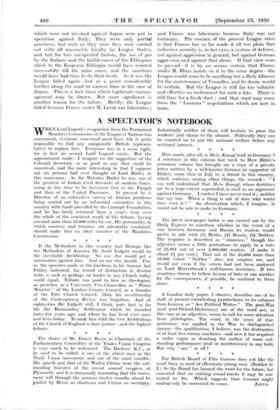A SPECTATOR'S NOTEBOOK
WHEN-Lord Lugard's resignation from the Permanent Mandates Commission of the League of Nations was announced, everyone concerned must have felt it quite impossible to find any comparable British represen- ' tative to replace him. Everyone was in a sense 'right, for in fact no second Lord Lugard exists. But the - appointment made—I imagine on the suggestion' of the . Colonial Secretary—is as good as any that could be conceived, and the more interesting in that I suppose not six persons had ever thought of Lord Halley in this connexion-. As Sir- Malcolm Hailey he was one of the greatest of Indian Civil Servants of modern times, rising in due time to be Governor first of the Punjab and then -of the- United Provinces. At present he is Director of an exhaustive survey of African- problems being carried out by an influential committee in this country with funds provided by the Carnegie Foundation, and he has- lately returned from a year's tour over the. whole of the- continent south of -the- Sahara, 'having • .covered more than 25,000 miles by car. His personality, in which .courtesy and firmness are admirably combined, should make him. an ideal member of the' Mandates Commission. • • .* * * If the Methodists in this country had Bishops like the Methodists of America Dr. Scott Lidgett would be the inevitable Archbishop. No one else would get a nomination against him. And no one else should. For, as- the speeches made at the luncheon in his honour last Friday indicated, his record of distinction in diverse fields is such as perhaps no leader in any Church today could equal. Tribute was paid to him 'as: theologian, as preacher, as- a University Vice-Chancellor, as "Prime Minister" of the London County Council, as a 'founder of the Free Church -Council. Only his co-editorship of the Contemporary Review was forgotten. And at eighty-two Dr. Lidgett still,- I think, puts first in his 'life the Bermondsey Settlement - which he founded forty-five years ago, and where -he has lived ever since -and. lives today. To rank. him with the two Archbishops of the Church of -England is bare justice—and the highest .tribute. - .. • . .
• * . *.
The choice of. Mr. Ernest Bevin as Chairman of the Parliamentary Committee -of the Trades Union Congress is very much to be welcomed: The Dockers' K.C., as he used to be called; is one. of the ablest . men in the Trade Union movement, and one of the most sensible. His speech. and that of Sir Walter Citrine were the out- standing features of the recent -animal congress at Plymouth; and it is immensely reassuring that the move- ment -will through the anxious twelve Months ahead be guided by Bevin as chairman and Citrine as secretary. Industrially neither of them will hesitate to press the workers' just claims to the utmost. POlitically they can be counted on to put the national welfare before any sectional interest.
* * How much, after all, is Mein Kampf read in Germany ? A reference in this column last week to Herr Hitler's notorious volume has brought me 'a copy of a private letter written by a well-known German (a support& of Hitler), some time in July to a friend in this country, which contains, among other things, the remark : " I can well understand that Mein Kampf, whose doctrines are to a large extent superseded, is used as an argument against Germany. I contest I have never read it ; neither has my son. When a thing is out of date why waste time over it ? " An observation which, I imagine, it would not be safe to make in Germany.
• * * The latest newspaper ballot is one carried out by the Daily Express to ascertain whether. in the event of a war between Germany and Russia its readers would prefer_ to side with (1) Perlin, (2) Russia, (8) Neither. The response is described as " immense," though the adjective seems a little portentous to .apply to a vote of 55,861 out of over 2,000,000 readers. , (I make it about 2/ per cent.) That out of the 55,000 more than 43,000 voted " Neither " does not surprise me, and would not even if the voters had not been nurtured on Lord Beaverbrook's well-known doctrines. If two counties choose to bellow hymns of hate at one another Jet the consequences, if_ possible, be confined to them alone. - * * - A London daily paper, I observe, describes one of its staff, at present contributing pyrotechnics to its columns from Geneva, as `-` Ace Political Writer." The post-War (and post-Oxford-Dictionary) use of the word ace, in this case as an adjective, seems to call for some attention from philologists. The word, in the sense of star- performer, was applied in the War to distinguished -airmen—the qualification, I believe, was the destruction -of at least five enemy machines—and now it has' acquired -a wider vogue as denoting the author of- some out- standing performance (real or meretricious) in any field. -But why " ace " at all ?
• * * The British Board' of Film Censors does not like the word Sissy as used of effeminate ybung men. (Neither do I.) So the Board has banned the word for the future, but conceded that on existing sound-tracks it may be con- verted to Sis. Which suggests that Censors might analogously be converted to sense.


















































 Previous page
Previous page